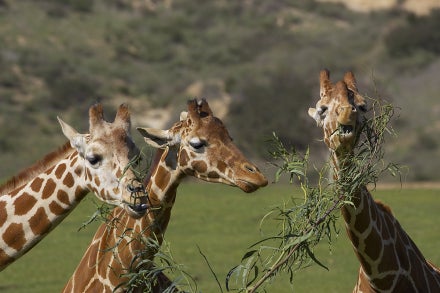
Zoo InternQuest is a seven-week career exploration program for San Diego County high school juniors and seniors. Students have the unique opportunity to meet professionals working for the San Diego Zoo, Safari Park, and Institute for Conservation Research, learn about their jobs, and then blog about their experience online. Follow their adventures here on the Zoo’s website!
During the first week of InternQuest, we met with Debbie Lowe, Supervisor of Nutritional Services at the San Diego Zoo, and Dr. Kate Kerr, Nutritionist at the San Diego Zoo. We learned about the different tasks that each of their jobs entail, and the path they took to reach each of their respective positions. As one of the nutritionists of San Diego Zoo Global, Dr. Kerr is responsible for deciding the diets of every animal at the San Diego Zoo each week and making sure that their dietary requirements are met. She works in collaboration with Ms. Debbie Lowe, whose job is to assemble the animal diets, and make sure they are properly packaged and labeled to be sent to various parts of the Zoo. Each week, the San Diego Zoo receives four shipments of restaurant quality produce, totaling between $8000 to $9000. Additionally, 240 pounds of fruit is utilized in the zoo daily, as well as 200,000 crickets that feed the Zoo’s birds daily. In addition to this, they also receive shipments of grain, nuts and seeds, meat, and fish weekly to encompass the diets of all the different animals that the San Diego Zoo houses.
Dr. Kerr received an undergrad degree in zoology and biology from Colorado State University. During her time there, she took one nutrition course and decided to pursue a career as a nutritionist. Later, Dr. Kerr decided to pursue a PhD in nutritional science, which encompassed the diets of cats, dogs, humans, and wildlife. For her dissertation, she studied the effects of a whole-prey raw diet on domestic and wild cats. She also interned during this time and later went on to work with various pet food companies. Dr. Kerr feels that what qualified her for her job at the zoo more than any other applicant was that she took advantage of every available opportunity to gain experience. In her opinion, practical experience can be just as valuable as technical knowledge. In order to excel at this job, she feels that it is important to be flexible, tedious, and lastly, to network. Dr. Kerr says that creating and maintaining connections in the setting that you want to work can help give you an edge over competition, even if you don’t get the job when you hoped to. Of course, working at a facility that is AZA (Association of Zoos and Aquariums) accredited helps. They make sure that zoos are meeting a set standard of care for their animals. Upon discussing the requirements of her job, she says that applicants should expect a heavy workload and high expectations. After all, she is required to maintain the health and meet the dietary requirements of every animal in the zoo.
We also met with Debbie Lowe. Her job as the Supervisor of Nutritional Services is to assemble each of the animal diets provided by Dr. Kerr. She is part of a small crew consisting of nine people, including herself and their manager. Ms. Lowe received a bachelor’s degree in general biology at UCSD. During college, she also minored in physical education. Ms. Lowe considers her job to be the “support system” of the Zoo. The diets that she prepares each night feed each of the Zoo’s inhabitants. From mealworms and crickets for the birds, to pellets, hay, and sometimes, raisins for the elephants, each meal is prepared by her team. Ms. Lowe also tells us that her department has a high turnover rate, not because the workers don’t love their jobs, but because many of her employees go on to be keepers at the Zoo. Even still, positions at the San Diego Zoo are limited and highly sought after. Both Dr. Kerr and Ms. Lowe encourage people with little experience to consider working at a smaller zoo to better qualify them for a position here.
Being in these positions requires a hardworking applicant who pays attention to detail. According to Dr. Kerr, being a nutritionist allows her to be creative while still utilizing the scientific knowledge she acquired in college. Over the past three and a half years, she has also been using the experience that she gained from her many ventures in college. After over 30 years at the Zoo, Ms. Lowe claims to enjoy the “fulfillment of being able to help.” Both say that despite the workload, they enjoy the visual impact and the obvious role that the play in each of the animal’s lives. Every day when they get to work, they get to see all of the Zoo’s well-kept animals, and know that they play a key role in keeping them at their best.
Brenda Davis, Careers Team
Week One, Winter Session 2019




